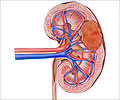Patients in the intermediate-risk (IR) group in clear-cell renal cell carcinoma (ccRCC), have a heterogeneous prognosis where elevated platelet count reflects the cancer-related inflammatory status.

‘Patients in the intermediate-risk (IR) group in clear-cell renal cell carcinoma (ccRCC), have a heterogeneous prognosis where elevated platelet count reflects the cancer-related inflammatory status. This helps formulate one of the most important challenges in mRCC that is, how prognostic stratification will guide front-line treatment selection and further explore optimal clinical trials design and stratification.’





They analyzed retrospective data from IGReCC (Institut Gustave Roussy Renal Cell Carcinoma) database using a multivariable Cox model with backward selection procedure and a Classification and Regression Tree Analysis (CART). And overall survival was defined from the start of 1L therapy to death or last follow-up. There were 777 patients with ccRCC who underwent treatment with an anti-VEGF 1L therapy from 2005 to 2017. Among them, 571 patients who were evaluable for IMDC score, 290 (51%) were classified as IR. It was observed that elevated platelet (PLT) count identified a subgroup of patients with poor outcome in the IMDC intermediate-risk population with ccRCC.
The Multivariable Model
"The risk stratification models for metastatic renal cell carcinoma (mRCC) patients were developed as a clinical tool to guide counseling, to predict individual patient prognosis and also to design clinical trial", says Dr. Laurence Albiges from The Université Paris-Saclay.
Median OS for patients with PLT > UNL (upper normal level) was 18 months versus 29 months for patients with normal PLT count.
Advertisement
This helps formulate one of the most important challenges in mRCC, that is, how prognostic stratification will guide front-line treatment selection and further explore optimal clinical trials design and stratification
Advertisement












